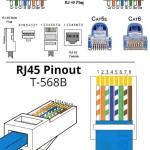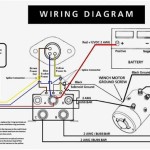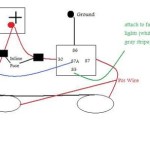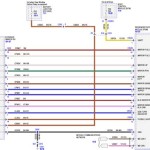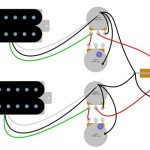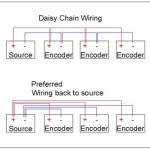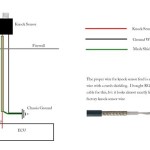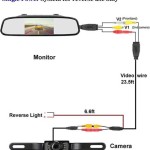A trailer wiring connector is an electrical device that joins the electrical system of a tow vehicle to the electrical system of a trailer. It allows the transfer of power, lighting, and braking signals between the two vehicles. A common type of trailer wiring connector is the 7-pin connector, often used for connecting lighting, braking, and auxiliary functions.
Trailer wiring connectors are crucial for ensuring the safe and reliable operation of trailers by providing a secure electrical connection and enabling communication between the tow vehicle and the trailer. They offer benefits such as improved lighting visibility, enhanced braking performance, and the ability to power trailer appliances. A key historical development in trailer wiring connectors was the standardization of connector types, which has facilitated compatibility and simplified the wiring process.
This article delves deeper into the world of trailer wiring connectors, exploring their types, functions, installation procedures, and troubleshooting tips. It aims to provide comprehensive knowledge and practical guidance for anyone dealing with trailer electrical systems.
Understanding the essential aspects of trailer wiring connectors is crucial for ensuring the safe and reliable operation of trailers. These aspects encompass various dimensions related to the design, function, and application of these connectors.
- Type: 4-pin, 5-pin, 6-pin, 7-pin, etc.
- Function: Lighting, braking, auxiliary power
- Voltage: 12V, 24V
- Amperage: Varies depending on the application
- Wiring: Color-coded for easy identification
- Compatibility: Matching connector types between tow vehicle and trailer
- Durability: Weather-resistant materials for longevity
- Safety: Ensures proper electrical connection and communication
- Installation: Proper wiring and grounding for optimal performance
- Troubleshooting: Identifying and resolving electrical issues
These key aspects are interconnected and play vital roles in the functionality and reliability of trailer wiring connectors. For instance, the type of connector determines the functions it supports, while the voltage and amperage ratings ensure compatibility with the electrical systems of both the tow vehicle and the trailer. Proper wiring and installation are crucial for safety and performance, and troubleshooting skills are essential for maintaining a reliable electrical connection.
Type
The type of trailer wiring connector refers to the number of pins or terminals it has, which determines the functions it supports. The most common types include 4-pin, 5-pin, 6-pin, and 7-pin connectors. These connectors are crucial components of trailer wiring systems, as they provide the physical and electrical interface between the tow vehicle and the trailer.
The type of connector required depends on the specific lighting, braking, and auxiliary functions needed for the trailer. For instance, a 4-pin connector typically supports basic lighting functions, while a 7-pin connector supports a wider range of functions, including electric brakes, reverse lights, and auxiliary power. Choosing the correct connector type is essential to ensure compatibility and proper operation of the trailer’s electrical system.
Understanding the different types of trailer wiring connectors is necessary for selecting the appropriate connector for a particular application. It also enables troubleshooting and maintenance of trailer wiring systems. By matching the connector type to the specific requirements of the tow vehicle and trailer, users can ensure a safe and reliable electrical connection, optimizing the performance and functionality of the trailer.
Function
The functions of trailer wiring connectors center around supporting lighting, braking, and auxiliary power for trailers. These functions are critical components of a trailer wiring connector, as they enable the trailer to communicate with the tow vehicle and perform essential operations safely and effectively.
Lighting functions are crucial for ensuring visibility and safety on the road. Trailer wiring connectors provide the electrical connection for trailer lights, including taillights, brake lights, turn signals, and clearance lights. By transmitting power from the tow vehicle to the trailer lights, the wiring connector ensures that the trailer is clearly visible to other drivers, enhancing overall road safety.
Braking functions are equally vital for the safe operation of trailers. Trailer wiring connectors facilitate the electrical connection between the tow vehicle and the trailer’s braking system. When the brake pedal is applied in the tow vehicle, the wiring connector transmits a signal to the trailer brakes, activating them and slowing down the trailer in sync with the tow vehicle. This coordinated braking action is crucial for maintaining control and preventing accidents.
Auxiliary power functions expand the capabilities of trailer wiring connectors beyond lighting and braking. These functions provide electrical power to various appliances and accessories in the trailer, such as refrigerators, air conditioners, and charging ports. By supplying power through the wiring connector, the trailer can utilize these amenities, enhancing comfort and convenience for travelers.
Understanding the connection between “Function: Lighting, braking, auxiliary power” and “Trailer Wiring Connector” is essential for several reasons. First, it helps in selecting the appropriate wiring connector for a particular application, ensuring compatibility and proper operation of the trailer’s electrical system. Second, it enables troubleshooting and maintenance of trailer wiring systems, allowing users to identify and resolve electrical issues effectively. Third, this understanding contributes to the safe and efficient use of trailers by ensuring that lighting, braking, and auxiliary power functions are operating as intended.
Voltage
The voltage rating of a trailer wiring connector, typically 12V or 24V, plays a crucial role in ensuring compatibility and proper operation within a trailer’s electrical system. The voltage supplied by the tow vehicle must match the voltage requirements of the trailer’s electrical components, including lighting, braking systems, and auxiliary appliances.
Incorrect voltage can lead to various issues. For instance, if a 12V trailer is connected to a 24V tow vehicle, the higher voltage can damage the trailer’s electrical components, resulting in malfunctioning lights, brakes, or other accessories. Conversely, if a 24V trailer is connected to a 12V tow vehicle, the lower voltage may not provide sufficient power to operate the trailer’s electrical systems effectively.
Real-life examples further illustrate the importance of matching voltage ratings. Many passenger vehicles and smaller trailers utilize 12V electrical systems, while larger trailers, such as those used for heavy-duty hauling or recreational vehicles, often require 24V systems. Understanding the voltage requirements of both the tow vehicle and the trailer is essential for selecting the appropriate wiring connector and ensuring a safe and reliable electrical connection.
In summary, the voltage rating of a trailer wiring connector is a critical component that must align with the electrical systems of both the tow vehicle and the trailer. Matching voltage ratings ensures the proper functioning of lighting, braking, and auxiliary power systems, preventing damage to electrical components and enhancing overall safety and reliability on the road.
Amperage
The amperage rating of a trailer wiring connector, which varies depending on the application, is a crucial factor that determines the amount of electrical current the connector can safely handle. This amperage rating is directly related to the electrical demands of the trailer’s components, such as lighting, brakes, and auxiliary appliances. Understanding the connection between amperage and trailer wiring connectors is essential for ensuring the proper functioning and safety of trailer electrical systems.
The amperage rating of a trailer wiring connector is determined by the total amperage draw of the trailer’s electrical components. For instance, a trailer with multiple high-power appliances, such as an air conditioner and refrigerator, will require a wiring connector with a higher amperage rating to accommodate the increased electrical load. Conversely, a trailer with only basic lighting and braking systems will require a lower amperage rating.
Real-life examples further illustrate the importance of matching amperage ratings. If a trailer wiring connector is undersized for the electrical load, it can lead to overheating, damage to the connector, and potential electrical fires. Conversely, if the amperage rating is too high, it may not provide adequate protection against electrical overloads, increasing the risk of damage to the trailer’s electrical system.
In summary, the amperage rating of a trailer wiring connector is a critical component that must be carefully matched to the electrical demands of the trailer. Understanding the connection between amperage and trailer wiring connectors enables the selection of appropriate connectors, ensuring the safe and reliable operation of trailer electrical systems. This understanding empowers individuals to make informed decisions when choosing and installing trailer wiring connectors, contributing to the overall safety and functionality of trailers on the road.
Wiring
In the realm of trailer wiring connectors, color-coded wiring plays a pivotal role in simplifying the often-complex process of electrical installation and maintenance. Color-coding enhances the ease of identification, ensuring that each wire is connected to its designated terminal, preventing errors and facilitating quick troubleshooting.
-
Standardized Colors:
Industry-established color standards assign specific colors to different functions, such as brown for taillights, yellow for turn signals, and white for ground. This standardization promotes consistency across different manufacturers, reducing confusion and enabling quick identification.
-
Reduced Installation Time:
Color-coded wiring significantly reduces installation time by eliminating the need for extensive wire tracing or referencing complex diagrams. Simply matching the wire colors to the corresponding terminal colors ensures correct connections, saving both time and effort.
-
Simplified Troubleshooting:
When electrical issues arise, color-coded wiring aids in rapid troubleshooting. By tracing the colored wires, it becomes easier to isolate the source of the problem, whether it’s a loose connection, a damaged wire, or a faulty component.
-
Enhanced Safety:
Color-coded wiring contributes to the overall safety of trailer electrical systems. Correctly connecting each wire to its intended terminal minimizes the risk of electrical shorts, circuit overloads, and potential fire hazards, promoting safe and reliable trailer operation.
In conclusion, the color-coding of trailer wiring connectors is an invaluable feature that streamlines installation, simplifies troubleshooting, and enhances safety. By adhering to standardized color assignments, trailer wiring becomes more accessible and less intimidating, empowering individuals to maintain and repair their trailer electrical systems with confidence.
Compatibility
In the world of trailer wiring, compatibility between the connector types of the tow vehicle and the trailer is paramount. This compatibility ensures a secure and functional electrical connection, enabling the safe and reliable operation of the trailer’s electrical systems, including lighting, braking, and auxiliary functions. Without proper compatibility, electrical issues, malfunctions, and even safety hazards can arise.
Real-life examples underscore the critical importance of matching connector types. Mismatched connectors can lead to incorrect wiring, resulting in non-functional lights, inoperable brakes, or damaged electrical components. Conversely, correctly matched connectors guarantee a seamless electrical interface, ensuring that all trailer functions operate as intended, contributing to overall safety on the road.
Understanding the connection between compatibility and trailer wiring connectors empowers individuals to make informed decisions when selecting and installing these connectors. By adhering to the principle of matching connector types, users can avoid costly mistakes and ensure the optimal performance of their trailer’s electrical systems. This understanding extends to troubleshooting and maintenance, as correctly matched connectors facilitate easy identification and resolution of electrical issues.
Durability
In the realm of trailer wiring connectors, durability is of paramount importance. Harsh outdoor conditions, such as exposure to moisture, dust, and extreme temperatures, can take a toll on electrical connections, leading to corrosion, malfunctions, and even safety hazards. To combat these challenges, trailer wiring connectors incorporate weather-resistant materials that ensure longevity and reliable performance.
The connection between durability and trailer wiring connectors is evident in their design and construction. Weather-resistant materials, such as UV-resistant plastics and corrosion-resistant metals, are employed to safeguard the connectors from the elements. These materials prevent moisture ingress, reducing the risk of electrical shorts and ensuring a stable electrical connection. Moreover, durable connectors can withstand vibrations and physical stress encountered during towing, preventing damage to internal components.
Real-life examples further underscore the significance of durability in trailer wiring connectors. Connectors made from inferior materials or lacking weather-resistant features are more susceptible to premature failure, leading to costly repairs and potential safety concerns. Conversely, durable connectors can endure the rigors of outdoor use, ensuring reliable operation and peace of mind for trailer owners.
Understanding the connection between durability and trailer wiring connectors empowers individuals to make informed decisions when selecting and installing these components. By prioritizing durability, users can ensure long-lasting performance, minimize maintenance costs, and enhance the overall safety and reliability of their trailer electrical systems.
Safety
In the realm of trailer wiring connectors, safety stands as a paramount concern. These connectors serve as the electrical gateway between tow vehicles and trailers, enabling the proper flow of power and signals for lighting, braking, and auxiliary functions. Ensuring a safe and reliable electrical connection is crucial for maintaining control, visibility, and overall road safety.
-
Secure Connection:
Trailer wiring connectors are designed to provide a secure and stable electrical connection, preventing loose or intermittent contacts that could lead to erratic lighting, brake malfunctions, or even electrical fires. Proper locking mechanisms and weather-resistant seals ensure a robust connection, minimizing the risk of electrical hazards.
-
Reliable Communication:
Beyond establishing a physical connection, trailer wiring connectors facilitate reliable communication between the tow vehicle and the trailer. They transmit electrical signals for brake lights, turn signals, and other functions, ensuring that the trailer’s intentions are clearly conveyed to other road users. This effective communication enhances overall safety on the road.
-
Circuit Protection:
Trailer wiring connectors often incorporate circuit protection features, such as fuses or circuit breakers, to safeguard against electrical overloads or short circuits. These protective elements prevent excessive current flow, reducing the risk of damage to electrical components or even fire hazards.
-
Standardized Design:
Standardized designs for trailer wiring connectors promote safety by ensuring compatibility between different tow vehicles and trailers. Universal connector types, color-coded wiring, and established wiring diagrams simplify installation and maintenance, minimizing the risk of incorrect connections and electrical malfunctions.
The safety aspects of trailer wiring connectors are intricately linked to the overall reliability and functionality of the trailer’s electrical system. By prioritizing secure connections, reliable communication, circuit protection, and standardized designs, these connectors contribute to safer and more efficient trailer operation, enhancing the safety of both the tow vehicle and the trailer on the road.
Installation
When it comes to trailer wiring connectors, proper installation plays a critical role in ensuring optimal performance, reliability, and safety. This involves careful attention to wiring and grounding practices to establish a stable electrical connection between the tow vehicle and the trailer.
-
Secure Connections:
Ensuring secure connections at all points is paramount. Loose or faulty connections can lead to intermittent power supply, flickering lights, or even complete electrical failure. Proper crimping or soldering of wire connections, along with the use of appropriate connectors and seals, helps maintain a solid electrical path.
-
Correct Wire Gauge:
Selecting the appropriate wire gauge is essential for handling the electrical load of the trailer. Inadequate wire size can result in voltage drop, overheating, or even fire hazards. Using the recommended wire gauge as specified by the manufacturer ensures sufficient current carrying capacity.
-
Grounding:
Establishing a proper ground connection is crucial for electrical safety and functionality. A good ground provides a low-resistance path for electrical current to return to the source, preventing voltage spikes and malfunctions. Proper grounding involves connecting the trailer frame to the tow vehicle’s frame using a dedicated ground wire.
-
Protection from Elements:
Protecting the wiring and connections from harsh elements is essential for long-term reliability. Exposing electrical components to moisture, dirt, or road debris can lead to corrosion, short circuits, or other issues. Using heat shrink tubing, waterproof connectors, and proper routing techniques helps safeguard the wiring system.
By adhering to these installation best practices, individuals can ensure that their trailer wiring connectors deliver optimal performance, providing a safe and reliable electrical connection between the tow vehicle and the trailer. This not only enhances the functionality of the trailer but also contributes to overall road safety by ensuring proper lighting, braking, and signal communication.
Troubleshooting
In the realm of trailer wiring connectors, troubleshooting electrical issues is an essential skill for ensuring the safe and reliable operation of trailers. Electrical problems can manifest in various forms, from flickering lights to complete loss of power, and prompt identification and resolution are crucial. The connection between troubleshooting and trailer wiring connectors is deeply intertwined, as effective troubleshooting relies heavily on a comprehensive understanding of the connector’s functions and proper installation practices.
Troubleshooting electrical issues within trailer wiring connectors involves a systematic approach that begins with identifying the root cause of the problem. This may require examining the physical condition of the connector, inspecting wire connections for looseness or corrosion, and verifying the compatibility between the tow vehicle’s electrical system and the trailer’s electrical demands. By utilizing diagnostic tools, such as voltage meters and circuit testers, individuals can pinpoint the source of the electrical fault and determine the appropriate course of action.
Real-life examples further underscore the importance of troubleshooting skills in the context of trailer wiring connectors. For instance, if a trailer’s turn signals are malfunctioning, troubleshooting can help identify whether the issue stems from a loose connection at the connector, a faulty wiring harness, or a problem with the trailer’s lighting system. By systematically isolating the cause, appropriate repairs can be made, restoring the functionality of the turn signals and ensuring the safety of the trailer on the road.
Understanding the connection between troubleshooting and trailer wiring connectors empowers individuals to maintain and repair their trailer’s electrical systems with confidence. This understanding extends to practical applications, such as diagnosing and resolving common electrical problems, performing preventative maintenance, and ensuring the overall reliability of the trailer’s electrical components. By embracing a proactive approach to troubleshooting, individuals can minimize downtime, enhance safety, and extend the lifespan of their trailers.










Related Posts

